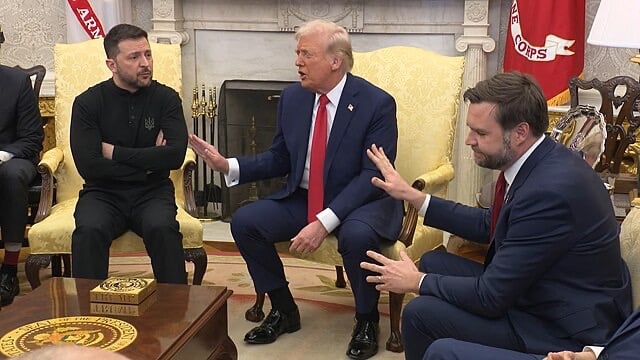Ukraine is making significant headway in securing a strategic minerals agreement with the United States, even as former President Donald Trump pushes back against fresh military support for Kyiv. This dual-track diplomacy—economic engagement versus military restraint—is reshaping the future of U.S.-Ukraine relations in 2025.
At the heart of this development is a proposed deal focused on critical minerals essential for green technologies and defense manufacturing. Ukrainian First Deputy Prime Minister Yulia Svyrydenko confirmed that “substantial progress” has been made in negotiations, with a finalized memorandum expected soon. But while this economic partnership takes shape, Trump has dismissed President Volodymyr Zelensky’s appeal for more Patriot missile systems, signaling a potential pivot in American support.
This article breaks down the geopolitical implications, economic benefits, and what this new strategy means for Ukraine’s war-time resilience and post-war recovery.
Ukraine’s Critical Minerals: A Strategic Asset
Ukraine is home to vast reserves of critical minerals such as lithium, titanium, and rare earth elements. These are not only vital for electric vehicles and renewable energy systems, but also for advanced military technologies.
By tapping into these resources, the U.S. aims to diversify supply chains currently dominated by China and secure raw materials necessary for domestic production. According to Reuters, both countries have been working on a joint investment framework that would allocate revenue from mineral exploitation toward Ukraine’s economic development.
This isn’t just about economics—it’s about resilience. As Ukraine continues to fend off Russian aggression, the minerals deal offers a pathway toward greater financial independence and long-term stability.
U.S.-Ukraine Economic Collaboration: What’s in the Deal?
The memorandum of understanding (MoU) expected in the coming weeks includes the creation of a joint investment fund. This fund will focus on:
- Infrastructure for mining and processing
- Sustainable energy and green projects
- Revenue-sharing models to reinvest in local economies
- U.S. technology and logistical support
This marks a shift from military-first aid to long-term economic empowerment. As reported by GB News, U.S. officials believe this approach will strengthen Ukraine’s strategic value without the political friction tied to sending weapons.
Trump’s Dismissal of Zelensky’s Missile Request
While economic cooperation surges forward, Trump has made headlines by rejecting Ukraine’s latest request to purchase additional Patriot missile defense systems. In remarks that have stirred controversy, he said:
“Zelensky is always looking to purchase more missiles. But we should be looking at peace, not escalation.”
This statement underscores a growing divide in U.S. political circles. Whereas President Biden had committed billions in military support, Trump appears more inclined to negotiate peace settlements or limit aid to non-military forms.
This isn’t just rhetoric. According to Space Project, the Trump administration is instead doubling down on internal defense projects like the “Golden Dome”—a space-based missile shield project aimed at defending U.S. interests domestically rather than projecting power abroad.
What This Means for Ukraine’s Defense Strategy
Zelensky’s administration now faces a critical challenge: how to maintain its defensive posture without an open stream of advanced weaponry from its biggest ally. While the minerals deal is a long-term win, the short-term risk of limited military resupply looms large.
Some potential consequences:
- Greater dependence on European defense commitments
- Faster development of domestic arms production
- Strategic recalibration of battlefield objectives
Ukraine may also look to strengthen ties with NATO members who remain open to military aid, while leveraging its new minerals deal to attract investment and innovation partnerships.
The Bigger Picture: Energy, Security, and Global Influence
This minerals agreement is not an isolated event—it’s part of a broader strategy to reshape the global order. With the U.S. aiming to decouple critical supply chains from China and Russia, Ukraine’s mineral wealth is becoming a key geopolitical lever.
If successful, the deal could:
- Reduce Western dependence on authoritarian supply chains
- Drive sustainable reconstruction in Ukraine
- Cement U.S.-Ukraine relations through commerce, not conflict
Moreover, it positions Ukraine not just as a battleground, but as a critical player in the global green and defense economy.
Conclusion
As the world watches Ukraine navigate the double challenge of war and recovery, the emerging U.S. minerals deal offers a beacon of opportunity. Even without renewed missile shipments, Kyiv is securing its place in a new economic and geopolitical reality—one built not just on arms, but on assets.
While Trump’s dismissal of further missile sales may stir debate, the long-term implications of the Golden Dome at home and Ukraine’s minerals abroad show that defense and diplomacy are evolving. This could be the new blueprint for Western engagement in global hotspots: less warfare, more wealth-building.
FAQs
1. What are critical minerals, and why are they important?
Critical minerals like lithium and rare earths are essential for electronics, renewable energy, and military applications. They’re central to both green energy and defense technology.
2. How much mineral wealth does Ukraine possess?
Ukraine has significant reserves of lithium, titanium, and rare earths—enough to make it a top global supplier if properly developed.
3. Why did Trump reject Zelensky’s request for missiles?
Trump suggested that continual missile requests escalate conflict and prefers negotiating peace, signaling a shift from Biden-era military support.
4. Will the minerals deal replace military aid?
Not entirely. It supplements Ukraine’s long-term recovery and development, but doesn’t immediately replace defensive capabilities.
5. What’s next for U.S.-Ukraine relations?
Expect increased economic cooperation, more private-sector involvement, and potentially more cautious U.S. military involvement under Trump’s influence.



